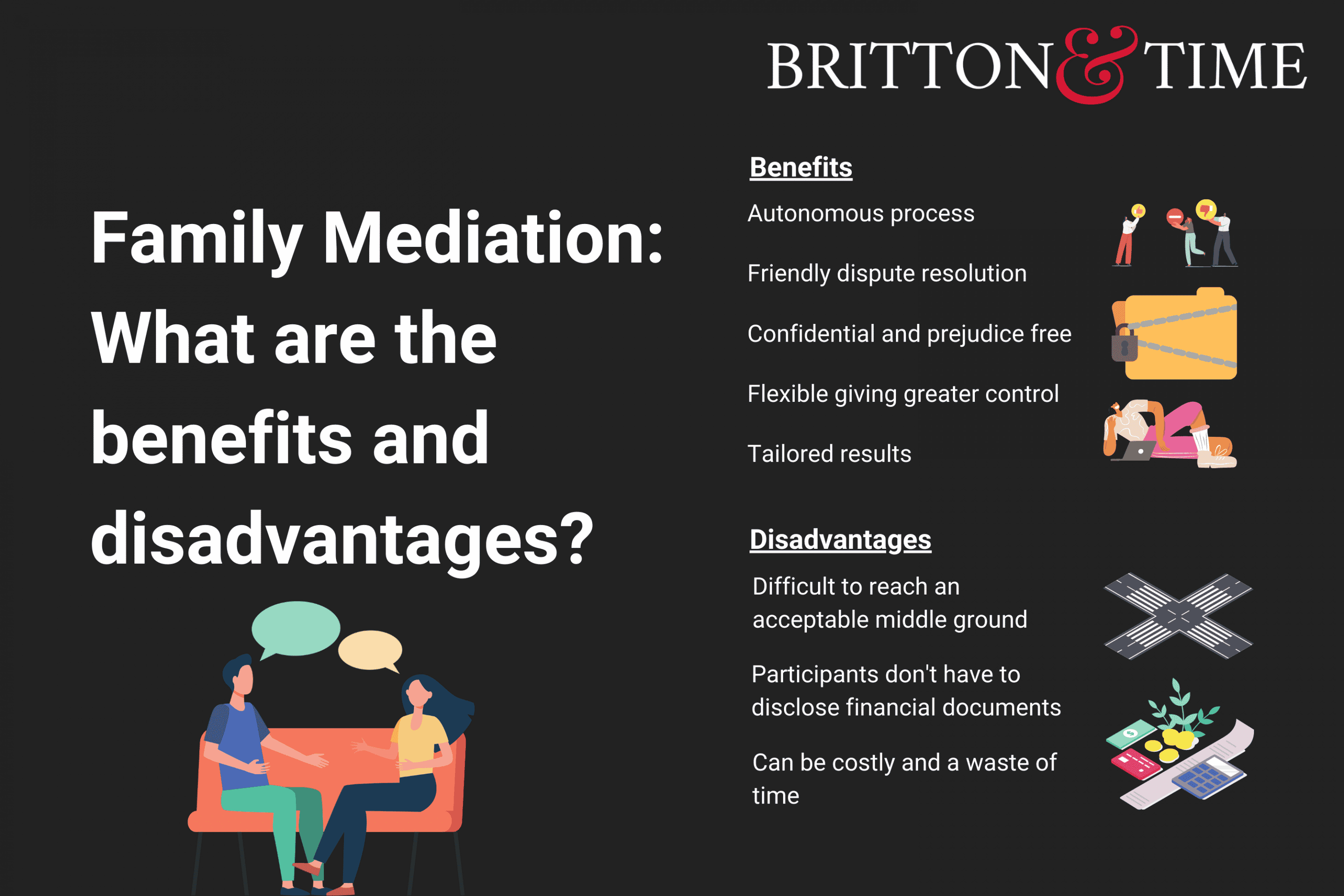In this article

Mediation is the process by which families can negotiate future arrangements with the help of a neutral third party (known as the mediator). The mediator does not tell parties what to do but can help them reach their agreements amicably. Our solicitors in London and Brighton often advise on taking mediation as a pre-action step before taking legal action.
For more information on family mediation, please visit our family law page. However, if you want to contact a solicitor directly, please call us on 0203 007 5500.
What is family mediation?
Put simply, like most forms of mediation, family mediation is a purely voluntary process. All matters discussed during the process remain purely confidential, meaning you can talk freely with your mediator about the most critical issues to you.
The process of mediation is entirely confidential and is protected by privilege. Protection by privilege means that the information you discuss cannot be brought up later in court. Therefore, you can offer to compromise your position at mediation but then maintain a more advantageous position in court if the matter does not settle at the family mediation stage.
What does family mediation involve?

During a MIAM, the participants will decide on a family mediator. This will be a neutral and impartial figure whose main objective is to help both parties negotiate and resolve their disputes.
The family mediator will not judge or impose any decision on either of the parties participating in the family mediation. Furthermore, the family mediator will not take sides. Instead, they will encourage the participants to understand their issues and take steps toward settling them amicably outside of court.
Remember...
The participants always remain in control of the settlement and have the ultimate decision on what terms they agree to.

Talk to us now. Save costs further down the line.
Save yourself potentially thousands of pounds by seeking advice now. Speak to us today for more information.
Lines open 24/7

When should you use a family mediator?
Commonly, family mediators help to settle disputes within marriages, civil partnerships or cohabiting couples. They can help to resolve a range of disputes, including:
- Who gains ownership over properties? (e.g. the family home)
- How are financial assets distributed? (e.g. money in bank accounts)
- Who will the children live with and how will they be paid for?
- How will the separation pan out overall?
The family mediation process does not prohibit the involvement of solicitors. However, it is sometimes more helpful if the parties attend mediation without their solicitors present and take separate independent legal advice outside of the process.
What are the benefits of family mediation?
Legal professionals often advise their clients to partake in family mediation, as it is:
- An autonomous process – The participants will be able to decide whether to settle their dispute.
- A friendlier method of settling disputes – It can preserve good relationships between parties.
- Confidential – The matters discussed at family mediation and all produced documents are without prejudice, meaning they cannot be disclosed unless all parties agree.
- Flexible – Participants have a greater level of control over the family mediation process as opposed to in court.
- Able to produce tailored results – Arrangements made in family mediation take all issues into account, meaning most outcomes are truly unique.
Are any agreements made through mediation legally binding?
Any agreements made during mediation are not legally binding, meaning they are not enforceable in court. However, by going over all the settlement options via mediation, both parties are more likely to find some middle ground. This means that you’ll probably find the settlement more appealing, especially when compared to the potential rigmarole of court action.
During the mediation process, you can get a solicitor to look over any agreements made. Parties often do this as you can later use the agreement in court to form a Consent Order.
Struggling with a family matter?
Don’t worry, we’re here to give the advice you need when you need it. Just contact us to arrange an appointment.
Lines open 24/7
020 3007 5500
Is mediation a requirement by the court?
In short, yes.
You will first attend a Mediation Information Assessment Meeting (MIAM) if you plan to apply to the courts to resolve the following disputes:
- Child Arrangements Order
- Special Guardianship Order
- Parental Responsibility Order
- Prohibited Steps Order
- Specific Issue Order
- An order appointing a Child’s Guardian
- Removal from Jurisdiction Order
It’s important to note that you will not need to attend MIAM if there are ongoing emergency proceedings or orders in place, which include the following:
- Care proceedings
- Supervision proceedings
- Consent order
- Protection order
- Supervision order
You may be exempt from attending MIAM if you fulfil one of the exceptions outlined in paragraph 3 of the C100 application form.
How long can mediation take?
Meditation usually takes around 1-2 hours per session.
Compared to settling in court, family mediation is faster because the process allows participants to control how it will progress.
When participants want to speed the mediation process up, they can schedule several sessions at the start and in quick succession. Alternatively, the participant may decide they want to slow the pace of mediation by scheduling each session individually and allowing time between them.
Compared to ongoing family litigation, mediation can be fast and effective, especially when both parties are choosing to be amicable.
What are the disadvantages of family mediation?
There are various disadvantages of using family mediation over settling in court. Some of the main reasons include:
- Mediators often find it difficult to persuade one of the participants to comply, when reaching an acceptable middle ground
- The family mediator cannot force participants to disclose financial documents
- It can be costly and a waste of time if the process does not achieve a settlement
In other forms of mediation, such as family law arbitration or family litigation, the courts guarantee the participants an outcome at the end of the process. In family mediation, there is no such guarantee.

What if we cannot reach an agreement through mediation?
If the family mediation process cannot resolve the dispute, you will have to seek a settlement through the courts. The most common reason why mediation fails is because one of the parties involved will refuse to attend. Another reason may be that the mediator feels that mediation is unworkable.
Regardless of the reason, for mediation to work, both parties must be willing to compromise and be amicable.
Why contact Britton and Time solicitors?
Our solicitors in Brighton are available to discuss your matter in privacy. For all family matters, we would ask you to attend an initial consultation. In this consultation, our solicitors will offer the following:
- Unlimited time to discuss the details of your case and ask any questions you may have
- An overview of your legal standpoint and the best options available to you
- A precise time and fee estimate for your case
If you’re considering the divorce process, we can refer you to an effective and qualified mediator. To arrange your initial consultation with one of our solicitors, simply call us on 020 3007 5500 or email us at [email protected].







0 Comments